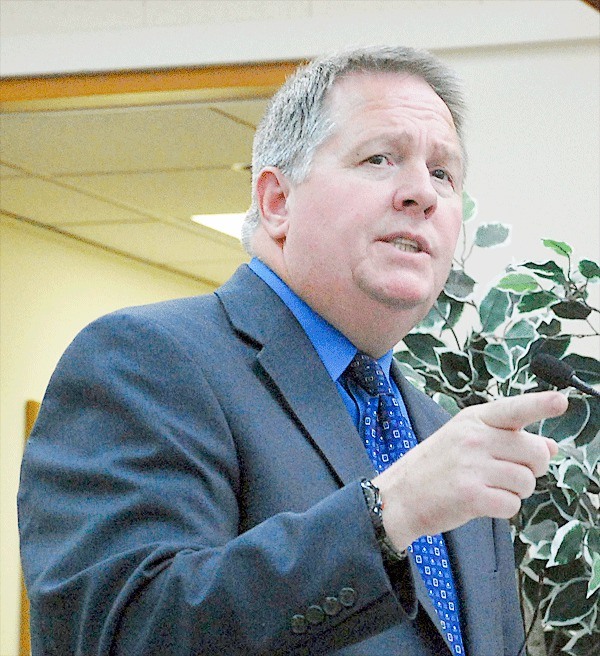Oak Harbor’s biennial 2011-2012 budget is beginning to take shape and although city officials have already slashed millions of “wish list” dollars, they still have a long way to go before balancing the budget with real numbers.
The numbers are changing almost daily but as of Friday, Oct. 15, at least $1.57 million in the general fund — the pot that pays for the majority of city services — still needed accounting for over the next two years: $690,772 in 2011 and $880,362 in 2012.
And that’s only if the two state liquor initiatives on the November general election ballot don’t pass. If they are successful, Initiatives 1100 and 1105 would widen the gap to $2.11 million: $958,772 in 2011 and $1.15 million in 2012.
A reduction in sales taxes, growth and development revenues, and a hefty “wish list” from city departments account for the shortfall, said Oak Harbor Finance Director Doug Merriman Thursday, at the second of three planned budget workshops before the City Council.
“We’re almost down 3 percent of what we budgeted in 2010,” he said.
The majority of the budget gap is the result of individual department requests, most of which have no real chance of approval. They initially totaled $2.48 million over expected revenues in 2011 and $3.52 million in 2012. The largest came from the fire department, which requested a budget increase of about 46 percent.
The department proposed budgets of $3.11 million in 2011 and $3.18 million in 2012 compared to $2.01 million spent in 2009 and about $2.12 million so far this year.
A large portion of the spike came from Chief Mark Soptich’s request to put away $1.56 million over the next two years for a fire truck replacement fund. According to Mayor Jim Slowik, the city’s usual practice to pay for new fire trucks is with bonds, so the department’s equipment replacement fund was slashed by $1.46 million.
Other expenses include the request for an additional full-time employee, along with six paid-on-call volunteer firefighters, and several capital requests, ranging from the replacement of a rescue unit vehicle and the purchase of a marine rescue unit to the installation of a vehicle bay exhaust system.
The police department’s budget was also discussed in detail during Thursday’s workshop. Chief Rick Wallace requested an increase of 4.5 percent in 2011 and 2.6 percent in 2012, but following suggestions by city staff, the increase has been whittled down to 3 percent and about 1.5 percent.
The department’s largest jump is attributed to its 19 patrol deputies. Total salaries and wages will grow from $1.44 million in 2010 to $1.50 million in 2011 and $1.56 million in 2012. The cost of benefits is also growing, from $509,087 in 2010 to $543,834 and $555,152 over the next two years.
The City Council has little authority over police pay raises. While they approve a final contract with the police union, the amounts are negotiated by city representatives. However, council members seemed less concerned about the pay raises than they were about officer staffing levels.
“Obviously you guys are doing a good job,” said City Councilman Jim Campbell, referring to a seemingly increased police presence over the past year. “Do you need more people?”
Wallace said that while he would like to say yes, the truth is the department’s staffing level is sufficient to meet the city’s current demands.
“The gut answer for any chief or sheriff is yes, but honestly we’re OK,” he said.
At some point, Wallace said he would like to hire back the high school resource officer but it can wait until the economy improves. These are tough times, he said, and he would rather continue efforts to fund the position with grants than burden city coffers.
In all, Merriman and other city officials have already whittled away $4.05 million from department requests over two years. However, with revenue losses accounting for $426,000 in 201l alone – that doesn’t include additional losses that would result from the passage of I-1100 and I-1105 – he said real cuts will have to be made from existing expenditures.
“We have some tough challenges ahead,” he said.
Merriman will likely recommend the council balance needed cuts with dipping into the city’s reserve fund, a pot that contains about $4.3 million. He expects the “economic down cycle” to continue for several more years at least, and the reserve funds should be spread out as long as possible.
The council will discuss the budget again in a third workshop next month. The meeting is set for Wednesday, Nov. 3, at City Hall.



